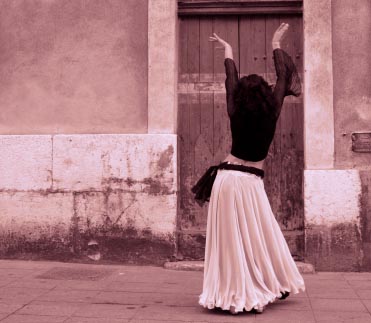Appreciation, Appropriation, and Exploitation in Ethnic Dance
Shasta Daisy McCarty

Let's admit it - most of us love that there are no rules in belly dance. The fact that various styles are referred to as "fusion" says it all. We can just dump everything in the great dance mixer and ask "will it blend?" While there may be no rules, this doesn't mean there aren't any boundaries. Many of us blunder across these lines at some point through ignorance or carelessness. In the interests of full disclosure, I'm a Texan born white girl (and I love rocking my Stay Puft marshmallow abs as much as the next belly dancer). This article is for Caucasian American women like me who were raised as part of the largely invisible dominant culture in the U.S.
Chalk it up to a spirit of intrepid adventure or a short attention span, we white folks are super curious about trying new stuff. In contrast, we really dislike getting out of our comfort zone to examine our unconscious privilege and insensitive behaviors. Excuse me if I rattle your ankle bells here; but we have some house cleaning to do.
Cultural Appreciation
Too often, our involvement in belly dance focuses on "Where can I get that glittery costume piece and how soon can I wear it?" Consumerism isn't a substitute for cultural appreciation. The process of learning new styles should include exploring the past (and present) story behind each dance tradition. Ongoing education needs to be a top priority for all belly dancers. Fortunately, this is part of the fun!
Is it wrong to get involved in an art form developed by another culture? It depends. Cultures can blend and evolve in ways that benefit everyone if the process is mutual and respectful. Sharing and adopting new customs is what people from different backgrounds do naturally as they get to know each other. We do need to ask ourselves "What can I give back?" Dig deep, you'll find something of value that you can offer.

The Gawazee, Egyptian Gypsies, were the first to bring this ancient dance out of the harems and into the public. -- Z
Cultural Appropriation
Consumerism is the most ubiquitous example of cultural appropriation; but the "buffet style" approach to belly dance choreography and costuming has its own perils. Have you danced in a restaurant that caters to clientele from a specific ethnic background and now wonder why the owner won't book you again?
Maybe your costume revealed a taboo body part. Perhaps a specific gesture or manner of interacting with the audience wasn't appropriate for that venue. You may have simply picked the wrong music for that audience because you don't know the difference between Egyptian and Turkish. Terms like "traditional" or "ethnic" don't mean a mish mash of whatever you think is cool. They refer to actual people groups with varied histories. In this case, ignorance isn't bliss. It's just plain rude - and it gives us a bad rep in the international belly dance scene.
Cultural Exploitation
Hopefully, you are motivated to belly dance because you have a passion for joyful movement. If you are learning this style because it seems exotic, you are making the women who created those dance traditions into the mysterious "other" in your mind. That kind of dehumanizing stereotyping is always harmful - even if it is couched in admiration. As history has shown time and again, when we start "othering" people we find it easier to co-opt, distort, and steal from their culture. Exploitation stems from a belief that the original contribution of the "other" has no intrinsic value - until you commercialize and monetize it for your own gain. If you belly dance professionally as a performer and/or instructor, take time to consider these ethical questions:
- Are you giving appropriate credit to the artists and cultures that inspired you?
- Will you be able to ensure that all contributing parties benefit in some way?
- Do you have permission to use a particular idea for profit?
- What steps are you taking to preserve the authenticity of traditions you draw from?
- How are you educating your students to be respectful?
When we violate the boundaries of other cultures, our privileged status usually protects us from any serious repercussions. This means we must take responsibility for changing ourselves. Then, we will be welcome guests instead of thoughtless intruders.
"An unexamined life isn't worth living" - Socrates
Other Articles
© 2004-2021 Zarifa's Touch of Egypt
Licensed for publication by Shasta Daisy McCarty
- Shop Zarifa's |
- Belly Dance Costume & Accessories |
- Egyptian Decor |
- Workshops & Classes |
- Belly Dance Classes
- Affiliate Program |
- Check Out |
- Contact |
- Links |
- Business Policies |
- Home
Zarifa's Touch of Egypt · Boise, Idaho 83646 · Contact